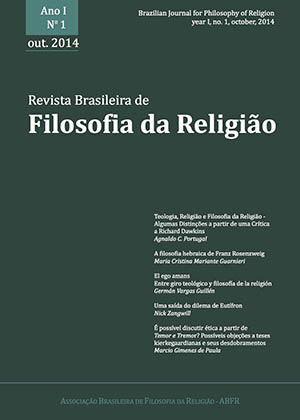The Ego Amans Between the Theological Turn and the Philosophy of Religion
DOI:
https://doi.org/10.26512/2358-82842014e13021Keywords:
ego amans, individuation, theological turn, technology, religion phenomenology. Edmund Husserl, Gilbert Simondon, Jean-Luc Marion.Abstract
The ego amans is the one that operates the
erotic reduction. This implies the transition from
transcendental subjectivity to its genetic study, which
ends up in the crisis of individuation as amorous
experience that starts from and returns to community.
This turn ”“ essentially theological ”“ is the manner of
facing up the positivisation of the life world in the
context of post-industrial and post-capitalist
societies. In the first part of the article, the passing
from ego cogito to ego amans is examined; the
phenomenology of ego amans and the ego amans as
overcome of positivism. However, one always runs the
risk that love turns out to be a mention empty of
content. How then to search for a critical watchfulness
over the assertions validity to which its enunciation
gives place? Reduction indicates an operation by
which the living becomes sphere of property; it is to
see how the incarnation of love as individuation
process gets effective. This incarnation that
individuates happens in the dialectic between eros
and agape, and this dialectic gives place to a project of
formation of flesh individuation. So the erotic reduction requires the return in and through personal
experience of the God of love either as eros or as
agape. These are the two poles of the ego amans'
experience in its constitution of the meaning of itself
and of the values of community and culture. Is it
possible to think about all this operation in which the
ego amans is installed without recurring to a world of
life, which is given to us both technically and
technologically? The hypothesis sustained here is that
religion as relinking requires the return to oneself in
the realization of the process of individuation. So, it is
the individual who, when knowing to say yes or no to
technic and technology, finds its serenity, and he finds
it precisely because he discovers aesthesis as a form of
getting back to creating and projecting a life meaning
in a technological world, which is cruel and unhuman
in mechanical relationships, including the
commercial and financial operations. So, the
individuating experience of ego amans consists in
exhibiting technicity as re-enchantment of the world.
What remains to ego amans as extension sphere of its
individuation? Summing up, the triple relationship:
freedom, evil, God.
Downloads
References
Contemporánea». Traducción de Raúl Velozo Farías. En: Acta fenomenológica
latinoamericana. Volumen I, Lima, Pontificia Universidad Católica del Perú; pp. 361-428.
Husserl, Edmund. (1961). Phänomenologische Psychologie. Vorlesungen Sommersemmester
1925. Den Haag, Martinus Nijhoff. (Hua. IX).
Husserl, Edmund. (1962). Die Krisis der europaischen Wissenschaften und die transzendentale
Phänomenologie. Ergazungsband. Texte aus dem Nachlass 1934-1937. Den Haag, Martinus
Nijhoff. (Hua. VI).
Husserl, Edmund. (2008). La crisis de las ciencias europeas y la fenomenología trascendental.
Bs. As., Prometeo; trad. Julia V. Iribarne.
Levinas, Emmanuel. (1977). Totalidad e infinito. Ensayo sobre la exterioridad. Salamanca,
Sígueme; trad. Daniel E. Guillot.
Marion, Jean-Luc. (2005). El fenómeno erótico. Bs. As., El Cuenco de Plata; trad. Silvia Mattoni.
Merino, J. Antonio. (1982) Humanismo y franciscanismo. Franciscanismo y mundo actual.
Madrid, Eds. Cristiandad.
Nenon, Thomas. (2011). La fenomenología como ciencia falible. En: Revista Co-herencia. Vol.
8, No 15 Julio - Diciembre 2011, pp. 45-67. Medellín, Colombia; trad. G. Vargas Guillén.
Rodríguez Latorre, Francisco. «Encuentros con Ensayitos. ”“Cuando Ensayitos habla de
argumentación y ciencia empezamos a encontrarnos». En: Ensayitos, en debate. Alcances y
limitaciones del método analítico. Bogotá, Universidad Pedagógica Nacional, 2013, p. 173.
Simondon, Gilbert. (2009). La individuación. A la luz de las nociones de forma e información.
Buenos Aires: Ediciones La Cebra y Editorial Cactus; trad. Pablo Ires.
Simondon, Gilbert. El modo de existencia de los objetos técnicos. Bs.As., Prometeo, 2007; trad.
Margarita Martínez y Pablo Rodríguez.
Vargas Guillén, Germán & Gil Congote, Lina Marcela. (2013b). Universidad e individuación.
”“Fenomenología de la individuación y de la formación como transducción de información”“.
Bogotá, Universidad Pedagógica Nacional ”“Doctorado Interinstitucional en Educación;
Cátedra Doctoral Educación y Pedagogía: Pensar la universidad. En prensa, 2013).
Vargas Guillén, Germán & Gil Congote, Lina. (2013a). La región de lo espiritual. ”“Individuo,
individuación. Bogotá, Universidad Pedagógica Nacional (Doctorado Interinstitucional en
Educación; Seminario doctoral: La región de lo espiritual. En prensa, 2013).
Vargas Guillén, Germán & Reeder, Harry P. (2009). Ser y sentido. Bogotá, San Pablo.
Vargas Guillén, Germán. (2012a). Fenomenología, formación y mundo de la vida.
Saarbrücken, EAE.
Vargas Guillén, Germán. (2012b). La fenomenología de lo invisible: el problema del método. En:
'Odos; No. 2, Julio”“Diciembre; pp. 86 á 99.

